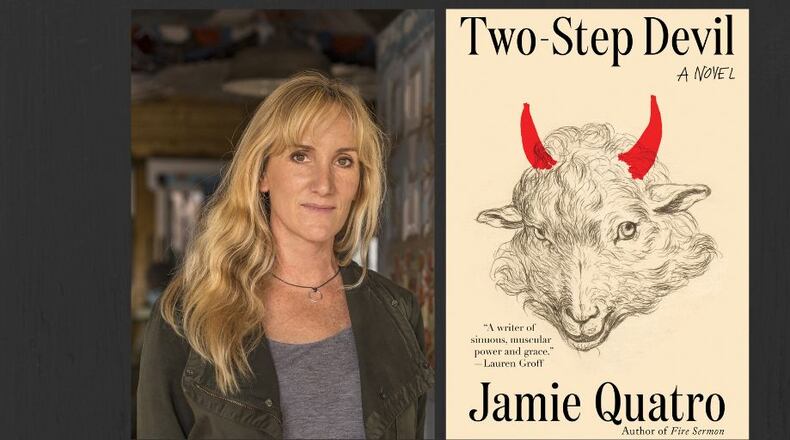Religion, art and the tribulations of the world come together in author Jamie Quatro’s innovative third book “Two-Step Devil,” a gripping tale that plays with form as much as point-of-view to deliver an enrapturing story. This blistering yet tender work of speculative fiction does not seek to condemn, but instead expands the conversation into the dark crevices where religious zealotry and mental health meet the perceptions of good and evil.
In the center of Quatro’s story sits Winston, a man called “the Prophet,” who has been blessed with prophetic visions. He believes his visualizations are revelatory messages from God sent to warn the world of its impending demise. A widower and former drunk who is now a reclusive, off-the-grid rascal in his 70s, the Prophet lives isolated from society and alienated from his adult son, Zeke. But he is not entirely alone.
The Prophet’s Appalachian shack, plastered with artistic depictions of his fantastical visualizations, frequently contains a visitor who manifests as “smoke hardened into the dark shape of Two-Step Devil crouched in the corner beside the wood stove.” Wearing a cowboy hat pulled low over his face, Two-Step is part companion, part tormentor, part theological mastermind who is on a quest to correct the devil’s maligned reputation.
Two-Step’s character provides a counterbalance to the Prophet, an uneducated man who adheres to a literal interpretation of both the Bible and his revelations. It’s through these two characters that Quatro first introduces her concept of duality, the double nature inherent in all things, that she explores in numerous ways throughout the rest of the narrative.
Quatro has crafted a sympathetic figure in the Prophet, a sick, elderly man desperately in need of human companionship who has succumbed to his madness. He stays afloat selling surplus vegetables and his artwork. He doesn’t technically charge for his “healing songs,” but customers occasionally insist on paying for them anyway.
One day in 2014, the Prophet is searching a junkyard for materials to complete an art piece when he sees a young woman with her wrists zip-tied together in the back of a Mercedes. He believes his calling is to rescue this “angel of God,” and the Prophet embarks on a harrowing and somewhat comical “rescue” mission that is far more of an abduction.
Quatro’s first book “I Want to Show You More” is a 2014 collection of stories that earned glowing reviews. Four years later, her debut novel “Fire Sermon” was less well received. It seems that in her third work, Quatro has hit her stride somewhere in the middle by riffing with form itself.
A lack of quotation marks enhances the dreamlike prose as she propels through the Prophet’s third-person, simplistic stream of consciousness. In a later section, Quatro employs a script format — complete with stage directions — as the Prophet and Two-Step duke it out in a fever dream of intellectual debate hearkening to John Milton’s “Paradise Lost” or Dante’s “Divine Comedy,” if not the Bible itself. Once inside Two-Step’s perspective, it doesn’t take long to realize he is far too knowledgeable to be solely a figment of the Prophet’s imagination.
Quatro employs magical realism in more than just Two-Step’s character. The Prophet’s revelations manifest fantastically when suddenly, without warning, a white movie screen drops in front of him and starts transmitting images. From people walking off the flat earth into an abyss, to the prophecy of the “Big Fish” — involving a messenger sent to help complete his mission — his visualizations are steeped in symbolism, sometimes prescient, and consume his thoughts, when Two-Step isn’t trying to derail him.
Michael is the name of the girl in the Mercedes, and the Prophet believes it cannot be a coincidence that she shares her name with the archangel Michael, another iconic figure who battles the devil. Too sick to go himself, the Prophet decides Michael is his Big Fish and asks her to deliver his Armageddon artwork to the President to save the United States from imminent destruction.
Meanwhile, Zeke has rejected his father because of his fanaticism. The son’s choice to sever contact highlights how extremism can be received as oppression by those who don’t share the same views. Although at some points in their relationship, it’s hard to decipher who is judging who with greater intolerance.
Given the rocky start between the Prophet and Michael, it’s surprising when she lets her guard down. But surviving a traumatic upbringing as a foster child has prepared her to view kindness differently than Zeke does. As a teenager fighting for survival while battling her own demons, Michael has a unique response to both the Prophet’s art and his philosophies. But that doesn’t mean she’s taking on his mission.
Michael relays her back story in a hazy, first-person immersion into her past that is visceral and disturbing. The narrative takes a harrowing dive into imprisonment, addiction, sex trafficking and a life without choice. Through Michael’s story line, Quatro delivers an entirely different statement on how mental health shapes perceptions of good and evil.
And that’s what makes Quatro’s experimental storytelling in “Two-Step Devil” so delightful — the subtle and not so subtle ways she spotlights duality. It isn’t just people who are a bundle of opposites, but perspectives and points-of-view, too. Two-Step’s jabbing, second-person narration drives home how society has missed this message with this rousing rebuke of human naiveté:
“You cannot stand for the horrific and the beautiful to touch, cannot fathom a system in which one person benefits from the suffering of another. But so it is. So creator has ordained.”
FICTION
“Two-Step Devil”
by Jamie Quatro
Grove Press
288 pages, $27
About the Author
Keep Reading
The Latest
Featured


